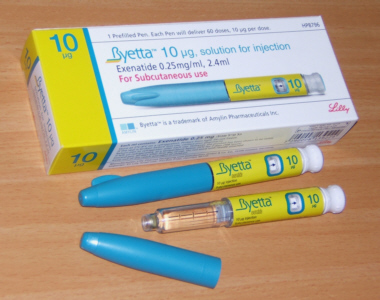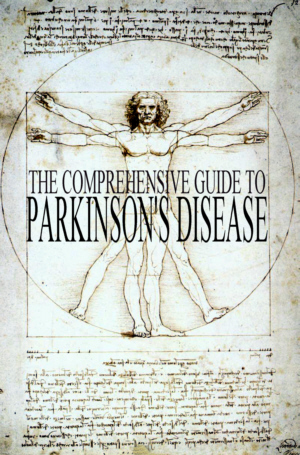|
|
Parkinson's Disease News covers
all significant new research, reports, books, and resources concerning
Parkinson's Disease.
Articles are chosen on the basis
of their medical significance or potential interest. Our overwhelming priority
is the facts, regardless of whether they contradict prevailing views or vested
interests. Analysis and further information are provided
either to explain the background or implications, or to
balance misleading claims. If you notice errors or inadequacies, or dispute what is
written, or want to propose articles, please
e-mail
[email protected].









4th August 2017 - New research
DIABETIC DRUG ASSESSED FOR USE IN PARKINSON'S DISEASE
|
CLICK HERE
FOR A
PRINTABLE OR WHITE BACKGROUND VERSION OF THIS ARTICLE |
Exenatide is a type 2 diabetes treatment that differs in its pharmacological
action and structure from insulin. Exenatide is an injected glucagon-like
peptide-1 agonist. The possible means of how it might affect Parkinson's
Disease is not known. It has no direct effect on dopamine.
 The
effects of exenatide were assessed in people with moderate Parkinson's
Disease. The primary outcome was the adjusted difference in the Movement
Disorders Society Unified Parkinson's Disease Rating Scale (MDS-UPDRS) motor
subscale (part 3). After over a year, off-medication scores on part 3 of the
MDS-UPDRS had improved by only 1�0 point in people taking exentaide and
worsened in people taking a placebo. Although it has been claimed that
exenatide can slow down Parkinson's Disease the efficacy is too mild to
justify such claims. Injection site reactions and gastrointestinal symptoms
were common adverse events in both groups. The
effects of exenatide were assessed in people with moderate Parkinson's
Disease. The primary outcome was the adjusted difference in the Movement
Disorders Society Unified Parkinson's Disease Rating Scale (MDS-UPDRS) motor
subscale (part 3). After over a year, off-medication scores on part 3 of the
MDS-UPDRS had improved by only 1�0 point in people taking exentaide and
worsened in people taking a placebo. Although it has been claimed that
exenatide can slow down Parkinson's Disease the efficacy is too mild to
justify such claims. Injection site reactions and gastrointestinal symptoms
were common adverse events in both groups.
In four previous studies the efficacy was also found to be mild. Unusually,
the effects of exenatide on Parkinson's Disease had continued to some extent
beyond its use. In those studies exenatide was well tolerated but weight
loss was common. Other adverse effects of the use of exenatide were nausea,
injection-site induration, dyslipidemia, vomiting, diarrhoea, headache and
hypoglycaemia.
Reference :
The Lancet [2017] S0140-6736(17)31585-4390 (D.Athauda, K.Maclagan,
S.S.Skene, M.Bajwa-Joseph, D.Letchford, K.Chowdhury, S.Hibbert, N.Budnik,
L.Zampedri, J.Dickson, Y.Li, I.Aviles-Olmos, T.T.Warner, P.Limousin,
A.J.Lees, N.H.Greig, S.Tebbs, T.Foltynie)
Complete
abstract
For more news go to
Parkinson's Disease News
 E-MAIL NOTIFICATION : If you would like to be
notified by e-mail when any new articles
are added to Parkinson's Disease News, please merely
e-mail
[email protected] with the message
"subscribe". No form of identity is required. E-mail addresses are
not used for any other purpose. E-MAIL NOTIFICATION : If you would like to be
notified by e-mail when any new articles
are added to Parkinson's Disease News, please merely
e-mail
[email protected] with the message
"subscribe". No form of identity is required. E-mail addresses are
not used for any other purpose.
|
|
|
 |
THE
COMPREHENSIVE GUIDE TO PARKINSON'S DISEASE
The Comprehensive Guide to Parkinson's
Disease, which is fully referenced, and over 800 pages long, is
the most comprehensive book concerning Parkinson's Disease. It includes the history of Parkinson 's Disease, famous
people with Parkinson's Disease, the complete biochemisty of
Parkinson's Disease,
its cytology and cytological effects,
anatomy and anatomical effects, physiology and physiological
effects, symptoms of every system in the body, the diagnosis methods
(observational, technological, chemical), biochemical causes, all the toxic causes, all the genetic causes, all the
pharmacological causes, all the medical disorders that cause Parkinson's Disease
symptoms, its treatments (biochemical, pharmacological,
surgical, natural, exercise methods, technological methods),
including all those treatments that exist and all those treatments
presently being developed, Parkinson's Disease organisations,
Parkinson's Disease web sites, and books on Parkinson's Disease
nursing.
CLICK HERE FOR MORE DETAILS |
|

|
|
.gif)
.gif)












